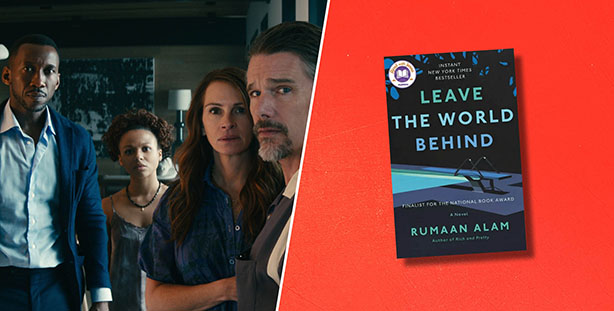“You never know when a time is the last time, because if you did you could never go on with life.” Rumaan Alam, Leave the World Behind
Leave the World Behind is an apocalyptic movie that begins with a weekend you went on as a family without foreseeing that your life would suddenly turn upside down, and contains intense messages from the first minute. We see former US President Barack Obama and his wife Michelle Obama in the production of this film, based on Rumaan Alam's novel published in 2020. The uncannily familiar scenario is filled with themes and messages you can tick off from beginning to end.
The majority of commentators agreed that this movie is an apocalyptic scenario and conspiracy theory. Although I agree with most of these, I want to look at it from a different perspective: Racism that never ends even when the apocalypse is near!
It annoyed me that this issue was trivialized and glossed over in the comments. How can we ignore the racism they present throughout the film, from the very first minutes, and how can we make it ordinary! This perception, which was created in the fetid depths of world history, continues to haunt human beings in this age, even while there is a frightening change and chaos going on outside. What a great heedlessness, what a vile arrogance!
Even as the world drifts towards an uncertain end, ego and arrogance never disappear. The writing in Alam's novel was quite pointed, but we can still get the same effect in the movie: racism and class anxiety. If you are obsessed with the color of the other person's skin even while the city from which you cannot return is being bombed outside, it means that there is a sick mentality here that is terrifying. But this perception of racism is not the first time humanity has encountered insanity. Many more like this have already been placed in minds and hearts. For those who haven't watched the movie, I can say this much; From the first scenes, the theme of racism is one of the main messages that deserves to be written in large font from the beginning to the end of the film.

Sam Esmail, the author and director of the film, presented everything in a slow, calm, and chilling way. It is a very concrete film about how the unshakable sense of trust between you and your next-door neighbor, whom you have spent years working on, is destroyed. It is one of the rare stories where people's fake smiles are mistaken for the precious stones that will form the society and the masks are removed. If you are one of the lucky ones, you can stay at home, in your comfort zone, and have enough food to last you for a while, without messing around. And you should stay away from people as much as possible, otherwise, you will end up disappointed, just like the situation these two families found themselves in.
However, when the white family renting the house sees two black characters in front of them, they try to humiliate and be rude to the father and daughter at every opportunity. In particular, Julia Roberts, the female character of the white couple, carries out this task in an extremely expert manner. Her husband, on the other hand, is the one who takes things a little more seriously and wants to carry out the work without spoiling his style and without even caring. Of course, there must be a good cop-bad cop attitude, otherwise, how will the scenario work? The female character, who cannot accept the idea that the black landlord who comes to her door will be the owner of that expensive house, questions this with their straight faces and continues the same attitude throughout the film, somewhat intensely and slightly. Even when the idea of living the last days of their lives dominates, the skin color madness engraved in their minds and souls is not enough to bring these two families closer. So much so that the fact that the father and daughter were admitted to their own home and slept in the basement even after proving that it was their own home was complete nonsense.
In a comment I read, it was written that Long Island, where the novel/film takes place, was a very accurate choice due to its ideological history. After doing a little research, I came to the following conclusion: Langdon Winner's book Do Artifacts Have Politics?, published in 1980 in his article, wrote that while the roads connecting Long Island to the city were being built, their bridges were made low enough to prevent public transportation from passing under them. Public vehicles would not be able to come to Long Island, only private car owners would be able to reach here. Of course, the real reason for this nonsense was racism. In those days, only white people had such an egoistic right to such discrimination because they could own private vehicles. Only white people could use the roads and beaches. Therefore, Long Island was a unique location choice for the story. There are many more in history; the oppression, torture, defeated rights, etc. of black people. The more one reads and learns, the more ashamed it becomes of their humanity.
As someone who has read two of the author's books so far (Leave the World Behind and Rich and Pretty), I would like to write a few things about the author. Alam highlights social class indicators rather than psychological depth. I can say that the priority is not so much to establish a deep and emotional bond between the reader and the story, but rather to awaken the race and class bubbles in the reader's mind. Moreover, he does this very well with his novel Leave the World Behind. Leave the World Behind is not a book about a global disaster; It is a book about racism or rather white rights. It literally controls and highlights the ignorance and mental eclipse of white people. It clearly shows us how stereotypical characters throughout history maintain their stability even when the world is destroyed. I wondered if it was the world or people's minds that were unlucky after reading the novel.
For those who want to read the book, I can say the following: The writing has magnificent language and a great sense of humor. This is a story with events and dialogues that could happen to any of us one day. Since it was published during the pandemic period, those who read it during lockdown may have felt that it was a bit claustrophobic, dark, and suffocating. It will be a weekend book that cleverly constructs high tension, family drama, class-race differences, increasing claustrophobia, and the feeling of being stuck in one place.
I have one last footnote; The film's cinematography, metaphors, and even current messages are very successful, but I cannot say the same about the acting. Mahershala Ali was the only person in the movie who truly conveyed his character to me.

















